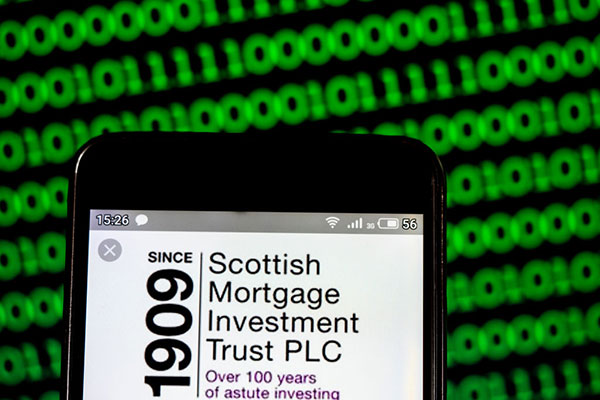Scottish Mortgage reassures investors over its unlisted holdings
4th August 2022 12:01
by Sam Benstead from interactive investor
The giant trust revalued its private stocks 351 times in the first half of the year in response to public market volatility.

Scottish Mortgage increased how often it revalued its private stock portfolio this year to ensure its portfolio was fairly valued in the face of volatile markets.
During the first half of the year, the trust performed 351 revaluations, more than double what it would have done if markets were calmer.
Crashing investor appetite for the high-growth stocks Scottish Mortgage invests in has led to increased pressure to keep its portfolio valuation fresh. The share price has fallen 30% this year.
- Find out about: Free regular investing | Interactive investor Offers | ii Super 60 Investments
Baillie Gifford, the trust behind Scottish Mortgage, said 44% of the private portfolio was re-evaluated more than five times, while 96% of the portfolio was updated more than two times. In total, 83 investments were revalued.
The £12.5 billion trust, as per its 30 June factsheet, now has 30.2% invested in unquoted stocks. In total, it owns 52 unlisted companies. Top investments include payments group Stripe, rocket company SpaceX and battery firm Northvolt.
The average write-down was 27.6%, similar to the 29.5% drop in the tech-heavy Nasdaq index. Some companies saw their valuations increased, meaning that the average change in private company valuation was -22.8%.
The valuation process is managed by an independent valuations team and overseen by a separate valuations group, which takes advice from an independent third party, S&P Global (formerly IHS Markit).
As a minimum, a third of the private component of the portfolio is evaluated each month, so each three-month period delivers a complete portfolio valuation. However, “trigger events”, such as new funding rounds or big share price changes to similar publicly listed companies, can mean valuations are carried out more regularly.
Speaking to interactive investor’s Funds Fan podcast in May, Lawrence Burns, the deputy fund manager of the trust, reassured investors that the current valuations of its unlisted companies were a fair reflection of the changes in valuations for comparable listed growth companies.
Burns explained: “As fund managers, neither Tom or I have anything to do with that process; it’s done at arm’s length, it’s independent from us or our views, we simply get notified of the changes after they’ve effectively been agreed.
“And what the committee are really trying to do is come to a fair value, by which we mean the price we think we would be able to achieve if we were to sell these holdings today in the open market.
- Scottish Mortgage hits record discount as fear takes over markets
- The investment trusts dangerously close to their private stocks limit
- Are Scottish Mortgage’s private holdings overvalued?
“And that’s very different from what the fund managers, myself, and Tom, might think they’re worth on a five to 10-year view. It’s about if we were to go out and sell them today, what’s the best guess at what we’d be able to sell them for.”
Burns acknowledged that it is “very fair” to ask how quick these valuations updated when public equity markets are volatile.
Baillie Gifford said its process was conservative and prudent but in volatile markets, movements in the valuations of the private companies will not be exactly aligned with those of the public holdings in the portfolio.
It said: “By way of example, over the past couple of years, we have often seen a temporary surge in the valuation of a number of private companies when they have made the transition to the public markets via special purchase acquisition company (SPAC) or IPO transactions.
“Cognisant that these valuation surges could be short-lived, we took the approach of not immediately marking up the valuations of their private peer group in response. This conservative and prudent approach meant that our privately held stocks did not typically increase to the same extent as some of the publicly listed holdings during the market highs last year, and so intuitively they shouldn’t necessarily fall to the same extent either.
“To put this into perspective, when we examine all the private holdings that have listed since the beginning of 2021, the median share price drop in the share price from their initial public share price to the end of June 2022 has been 79%. However, if we look at the movement from the final private valuation of each stock before the listing price was set by the market, this is a drop of 34% .”
These articles are provided for information purposes only. Occasionally, an opinion about whether to buy or sell a specific investment may be provided by third parties. The content is not intended to be a personal recommendation to buy or sell any financial instrument or product, or to adopt any investment strategy as it is not provided based on an assessment of your investing knowledge and experience, your financial situation or your investment objectives. The value of your investments, and the income derived from them, may go down as well as up. You may not get back all the money that you invest. The investments referred to in this article may not be suitable for all investors, and if in doubt, an investor should seek advice from a qualified investment adviser.
Full performance can be found on the company or index summary page on the interactive investor website. Simply click on the company's or index name highlighted in the article.